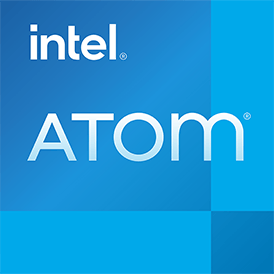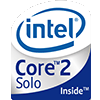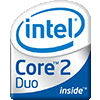
Intel Atom Z3745D Benchmark, Test and specs
Last updated:
The Intel Atom Z3745D has 4 cores with 4 threads and is based on the 4. gen of the Intel Atom series. The processor uses a mainboard with the BGA 1380 socket and was released in Q1/2014. The Intel Atom Z3745D scores 184 points in the Geekbench 5 single-core benchmark. In the Geekbench 5 multi-core benchmark, the result is 631 points.

| Name: | Intel Atom Z3745D |
|---|---|
| Family: | Intel Atom (108) |
| CPU group: | Intel Atom Z3700 (16) |
| Architecture: | Bay Trail |
| Segment: | Mobile |
| Generation: | 4 |
| Predecessor: | -- |
| Successor: | -- |
CPU Cores and Base Frequency
The Intel Atom Z3745D has 4 CPU cores and can calculate 4 threads in parallel. The clock frequency of the Intel Atom Z3745D is 1.33 GHz (1.83 GHz). The number of CPU cores greatly affects the speed of the processor and is an important performance indicator.
| CPU Cores / Threads: | 4 / 4 |
|---|---|
| Core architecture: | normal |
| Cores: | 4x |
| Hyperthreading / SMT: | No |
|---|---|
| Overclocking: | No |
| Frequency: | 1.33 GHz |
| Turbo Frequency (1 Core): | 1.83 GHz |
| Turbo Frequency (4 Cores): | -- |
Internal Graphics
The Intel Atom Z3745D has integrated graphics, called iGPU for short. Specifically, the Intel Atom Z3745D uses the Intel HD Graphics (Bay Trail GT1), which has 32 texture shaders and 4 execution units. The iGPU uses the system's main memory as graphics memory and sits on the processor's die.
| GPU name: | Intel HD Graphics (Bay Trail GT1) |
|---|---|
| GPU frequency: | 0.31 GHz |
| GPU (Turbo): | 0.79 GHz |
| Compute units: | 4 |
| Shader: | 32 |
| Hardware Raytracing: | No |
| Release date: | Q3/2013 |
| Max. displays: | 2 |
|---|---|
| Generation: | 7 |
| Direct X: | 11.2 |
| Technology: | 22 nm |
| Max. GPU Memory: | 2 GB |
| Frame Generation: | No |
Hardware codec support
A photo or video codec that is accelerated in hardware can greatly accelerate the working speed of a processor and extend the battery life of notebooks or smartphones when playing videos.
| h265 / HEVC (8 bit): | No |
|---|---|
| h265 / HEVC (10 bit): | No |
| h264: | Decode / Encode |
| VP8: | No |
| VP9: | No |
| AV1: | No |
|---|---|
| AVC: | Decode / Encode |
| VC-1: | Decode |
| JPEG: | Decode |
Memory & PCIeThe processor can use up to 2 GB memory in 1 (Single Channel) memory channels. The maximum memory bandwidth is 10.6 GB/s. The memory type as well as the amount of memory can greatly affect the speed of the system. |
|
| Memory type: | Memory bandwidth: |
|---|---|
| DDR3L-1333 | 10.6 GB/s |
| Max. Memory: | 2 GB |
| Memory channels: | 1 (Single Channel) |
| ECC: | No |
| PCIe: | |
| PCIe Bandwidth: | -- |
Thermal ManagementThe thermal design power (TDP for short) of the processor is 4 W. The TDP specifies the necessary cooling solution that is required to cool the processor sufficiently. The TDP usually gives a rough idea of the actual power consumption of the CPU. |
|
|---|---|
| TDP (PL1 / PBP): | 4 W |
| TDP (PL2): | -- |
| TDP up: | -- |
| TDP down: | -- |
| Tjunction max.: | 90 °C |
Technical details
The Intel Atom Z3745D is made in 22 nm. The smaller the manufacturing process of a CPU, the more modern and energy-efficient it is. Overall, the processor has 2.00 MB cache. A large cache can greatly speed up the processor's speed in some cases such as games.
| Technology: | 22 nm |
|---|---|
| Chip design: | Monolithic |
| Socket: | BGA 1380 |
| L2-Cache: | -- |
| L3-Cache: | 2.00 MB |
| AES-NI: | Yes |
| Operating systems: |
| Virtualization: | VT-x, VT-x EPT |
|---|---|
| Instruction set (ISA): | x86-64 (64 bit) |
| ISA extensions: | SSE4.1, SSE4.2 |
| Release date: | Q1/2014 |
| Release price: | -- |
| Part Number: | -- |
| Documents: | Technical data sheet |
Rate this processor
Benchmark results

The benchmark results for the Intel Atom Z3745D have been carefully checked by us. We only publish benchmark results that have been created by us or that have been submitted by a visitor and then checked by a team member. All results are based on and fullfill our benchmark guidelines.
Geekbench 5, 64bit (Single-Core)
Geekbench 5 is a cross plattform benchmark that heavily uses the systems memory. A fast memory will push the result a lot. The single-core test only uses one CPU core, the amount of cores or hyperthreading ability doesn't count.

|
Intel Celeron N2920
4C 4T @ 2.00 GHz |
||

|
Intel Atom Z3740
4C 4T @ 1.86 GHz |
||

|
Intel Atom Z3735F
4C 4T @ 1.83 GHz |
||
|
|
Intel Atom Z3745D
4C 4T @ 1.83 GHz |
||

|
Intel Core2 Solo SU3500
1C 1T @ 1.40 GHz |
||

|
Intel Atom Z3740D
4C 4T @ 1.83 GHz |
||
|
|
HiSilicon Kirin 658
8C 8T @ 2.35 GHz |
||
Geekbench 5, 64bit (Multi-Core)
Geekbench 5 is a cross plattform benchmark that heavily uses the systems memory. A fast memory will push the result a lot. The multi-core test involves all CPU cores and taks a big advantage of hyperthreading.

|
Intel Atom Z3740D
4C 4T @ 1.33 GHz |
||

|
Intel Celeron 2955U
2C 2T @ 1.40 GHz |
||

|
Intel Celeron 2957U
2C 2T @ 1.40 GHz |
||
|
|
Intel Atom Z3745D
4C 4T @ 1.33 GHz |
||

|
Intel Core2 Duo E4700
2C 2T @ 2.60 GHz |
||

|
AMD A4-6210
4C 4T @ 1.80 GHz |
||

|
AMD A6-5400K
2C 2T @ 3.80 GHz |
||
Geekbench 6 (Single-Core)
Geekbench 6 is a benchmark for modern computers, notebooks and smartphones. What is new is an optimized utilization of newer CPU architectures, e.g. based on the big.LITTLE concept and combining CPU cores of different sizes. The single-core benchmark only evaluates the performance of the fastest CPU core, the number of CPU cores in a processor is irrelevant here.

|
Intel Atom C2350
2C 2T @ 2.00 GHz |
||

|
MediaTek MT6750
8C 8T @ 1.50 GHz |
||

|
Intel Atom x5-Z8300
4C 4T @ 1.84 GHz |
||
|
|
Intel Atom Z3745D
4C 4T @ 1.83 GHz |
||

|
AMD GX-412HC
4C 4T @ 1.60 GHz |
||

|
AMD E-450
2C 2T @ 1.65 GHz |
||

|
AMD GX-412TC
4C 4T @ 1.40 GHz |
||
Geekbench 6 (Multi-Core)
Geekbench 6 is a benchmark for modern computers, notebooks and smartphones. What is new is an optimized utilization of newer CPU architectures, e.g. based on the big.LITTLE concept and combining CPU cores of different sizes. The multi-core benchmark evaluates the performance of all of the processor's CPU cores. Virtual thread improvements such as AMD SMT or Intel's Hyper-Threading have a positive impact on the benchmark result.

|
Intel Celeron N3050
2C 2T @ 2.16 GHz |
||

|
Intel Celeron N2820
2C 2T @ 2.39 GHz |
||

|
Intel Celeron N2808
2C 2T @ 2.25 GHz |
||
|
|
Intel Atom Z3745D
4C 4T @ 1.33 GHz |
||

|
Intel Atom Z3740
4C 4T @ 1.33 GHz |
||

|
Intel Celeron N2807
2C 2T @ 2.16 GHz |
||

|
Intel Celeron N3000
2C 2T @ 2.08 GHz |
||
iGPU - FP32 Performance (Single-precision GFLOPS)
The theoretical computing performance of the internal graphics unit of the processor with simple accuracy (32 bit) in GFLOPS. GFLOPS indicates how many billion floating point operations the iGPU can perform per second.

|
MediaTek Helio G70
ARM Mali-G52 MP2 @ 0.82 GHz |
||

|
MediaTek Helio P65
ARM Mali-G52 MP2 @ 0.82 GHz |
||

|
Samsung Exynos 5410
PowerVR SGX544 MP3 @ 0.53 GHz |
||
|
|
Intel Atom Z3745D
Intel HD Graphics (Bay Trail GT1) @ 0.79 GHz |
||

|
Intel Atom Z3775D
Intel HD Graphics (Bay Trail GT1) @ 0.79 GHz |
||

|
Intel Celeron J1850
Intel HD Graphics (Bay Trail GT1) @ 0.79 GHz |
||

|
Intel Celeron N2808
Intel HD Graphics (Bay Trail GT1) @ 0.79 GHz |
||
Estimated results for PassMark CPU Mark
Some of the CPUs listed below have been benchmarked by CPU-monkey. However the majority of CPUs have not been tested and the results have been estimated by a CPU-monkey’s secret proprietary formula. As such they do not accurately reflect the actual Passmark CPU mark values and are not endorsed by PassMark Software Pty Ltd.

|
Intel Pentium T2390
2C 2T @ 1.86 GHz |
||

|
Intel Celeron J1750
2C 2T @ 2.41 GHz |
||

|
Intel Celeron J1800
2C 2T @ 2.58 GHz |
||
|
|
Intel Atom Z3745D
4C 4T @ 1.33 GHz |
||

|
AMD C-70
2C 2T @ 1.33 GHz |
||

|
Intel Core2 Duo E6320
2C 2T @ 1.86 GHz |
||

|
Intel Core2 Duo E6300
2C 2T @ 1.86 GHz |
||
Benchmarks

Geekbench 5 (SC)
2,488 entries
2,488 entries

Geekbench 5 (MC)
2,461 entries
2,461 entries

Geekbench 6 (SC)
1,755 entries
1,755 entries

Geekbench 6 (MC)
1,703 entries
1,703 entries

FP32 SP (iGPU)
2,042 entries
2,042 entries

PassMark CPU-Mark
2,392 entries
2,392 entries

Geekbench 3 (SC)
942 entries
942 entries

Geekbench 3 (MC)
938 entries
938 entries
Popular comparisons
back to index









